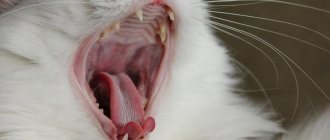Why is it wrong to kiss cats?
The cat has always been associated with something mystical and mysterious, and some people are afraid to kiss this animal for superstitious reasons. Such caresses can supposedly take away a person’s vitality and provoke him to recklessness. But let’s leave the mysticism to sorcerers and magicians, and here we’ll look at the sanitary and hygienic reasons why you shouldn’t kiss a cat. Let’s not forget that these adorable “fluffies” are predators by nature and the microflora of their body is significantly different from that of humans.
© shutterstock
Common diseases
Here are some of the most common diseases that can pass from cats to humans. Agree, this is a pretty good reason why you shouldn’t kiss cats.
- Toxoplasmosis. This disease affects the liver, spleen, eyes, nervous system, heart and other organs. It is especially dangerous for girls “in an interesting position.” Toxoplasmosis can cause irreversible intrauterine damage to the fetus and affect its development.
- "Scratchies." This disease is quite common, although it is not very common to talk about it. The scratched areas can become very inflamed. A rash may appear, an allergic reaction, intoxication, and inflammation of the lymph nodes may occur.
- Worms. The disease is caused by parasites that live in the bodies of cats and humans. It's very easy to get infected. Don’t think that if your pet doesn’t go outside, then it’s “clean.” If a cat eats raw meat or fish, then it definitely has worms.
- Rabies. A fairly well-known disease that can be fatal. It is transmitted by bites along with the saliva of a sick animal. Of course, domestic pussies rarely go wild, but it still happens.
- Plague. This is a very dangerous disease. It is generally accepted that it is carried by rats, but cats can also be sources of infection. In humans, the plague causes severe fever, sepsis and attacks the lungs.
- Felinosis. It manifests itself in humans in the form of a rash, pustular inflammation, fever and other unpleasant symptoms. It is transmitted mainly from cats through mucous membranes and saliva.
- Lichen. A very unpleasant and common disease. Fungal infection causes hair loss, severe itching, sores and redness. It takes quite a long time to heal.
Something about cat hygiene
A cat, in general, is a very clean animal; it cannot be called dirty. She defecates in certain places, “cleans up” after herself, constantly licks herself, and loves to rest in clean places. But most cats have fur, and this is an excellent habitat for many parasites. If you kiss a pet, contact with microorganisms is inevitable.
Pets that live indoors and do not go outside are unlikely to become infected with fleas. But dust mites can accumulate in their fur, which are invisible to the human eye. Microscopic mites are a source of severe allergies. By and large, you can’t not only kiss a cat, you can’t even touch the animal’s fur with your face
A domestic cat trained to a litter box will always go to this place. But often she gets her paws dirty in feces, and then spreads her footprints around the apartment. They may also be invisible, but in such an environment much more microbes accumulate. Even the most hygienic owner does not attach much importance to this fact. However, when trying to kiss a cat, people notice a large number of microorganisms on the skin.
Among other things, the “mustachioed-striped” ones have a completely different immunity. They are more resistant to pathogenic microbes than humans. The cat may not get sick itself, but it will be a carrier of viruses, bacteria, and fungi that are dangerous to human health. They are transmitted by kissing an animal. Many infections cannot be noticed and do not cause symptoms in the carrier.
Based on this, we can draw an unambiguous conclusion: cat petting is not hygienic, even if the pet looks clean and well-groomed. Kissing a cat is dangerous.
Dangerous neighborhood
By receiving good nutrition and regular grooming, your pet can look completely healthy: well-fed sides, radiant eyes, shiny coat. However, it can be a carrier of pathogenic particles dangerous to humans, including viruses, bacteria, fungal microflora and parasites.
If a cat has access to the street and “walks on its own,” then the likelihood of bringing infection into the house on its paws and fur increases tenfold. Dirty travel through garbage cans and basements, eating garbage, contact with rats and unkempt stray creatures increases the risk of transmitting pathogens of dangerous diseases to owners:
- Rabies . The deadly virus usually enters the bloodstream through the bite of a sick animal. However, there have been cases of infection through saliva that gets onto the wound surface of the skin or mucous membrane. In the wild, the main source of the disease is foxes, and in the city - stray dogs and cats. The virus spreads along nerve fibers and affects the central nervous system, leading to aggressive behavior, paralysis and death. Veterinarians warn: you should never touch, much less pick up or press an unfamiliar cat to your face. The closer the site of initial penetration of the pathogen is to the head, the shorter the incubation period and the less time to take preventive measures and administer a life-saving vaccine.
- Toxoplasmosis . The causative agent of toxoplasmosis is the microscopic parasite Toxoplasma gondii, which enters the body through contact with infected animals, their blood, entrails and feces, as well as through eating poorly cooked or fried meat. If a pet is a carrier of toxoplasma, the owner can easily become infected by changing the litter in the cat's litter box and forgetting to wash their hands afterward. Some people have asymptomatic toxoplasmosis, while others experience a slight increase in temperature, conjunctivitis, lethargy, swollen lymph nodes, and dysfunction of the liver, heart, and nervous system. Toxoplasma poses a particular danger to pregnant women, causing intrauterine fetal death, serious developmental disorders and the birth of an oligophrenic child.
- Salmonellosis . This is a highly contagious infectious disease of animals caused by bacteria from the genus Salmonella and affecting mainly the digestive and respiratory systems. In young animals, the disease is severe, with general intoxication, fever, signs of acute gastroenteritis and bronchitis. A pet can become infected with salmonella through contact with sick pets, birds and harmful rodents. If sanitary standards are not observed at poultry farms, poultry carcasses and eggs become the source of the disease. A person runs the risk of getting salmonellosis by caring for a sick kitten or eating meat products that have not passed veterinary control.
- Chlamydia . In cats, the intracellular bacterium Chlamydophila felis most often affects the eyes, leading to chronic conjunctivitis. In babies from 1 to 3 months, severe inflammation of the mucous membrane of the eyes and profuse lacrimation are accompanied by decreased activity, runny nose, swelling of the throat and bronchitis. Mature cats become infected through sexual contact, newborn kittens - when passing through the female's birth canal. In humans, the course of feline chlamydial conjunctivitis has a lubricated form and proceeds easily. Infection is possible through contact with a carrier animal. For treatment, eye ointments containing antibiotics are used.
- Dermatomycoses . Fungal infections of the skin, known as ringworm, lead to redness, itching, dandruff, bald patches and brittle hair. The course of the disease is complicated by the addition of a pyogenic infection. Young children are most sensitive to dermatomycosis due to instability of the immune system and non-compliance with mandatory hygiene rules. If symptoms of the disease are detected in a cat, treatment should be started immediately, and all family members should undergo a preventive examination by a dermatologist.
- Helminths . Cats can be hosts to several types of parasitic worms (worms), which live primarily in the intestines, but cause intoxication of the entire body. Kittens are most often infected with roundworms (nematodes), the most common of which are roundworms. Their number can be so great that the intestinal wall ruptures and the baby dies from peritonitis. Adult animals are infested with tapeworms, the most dangerous of which is echinococcus. In the human body, the larva travels through the bloodstream into the liver and forms blisters there, in which it slowly develops and grows. Cats become infected with helminths from each other, or by eating raw meat, liver, or fish with microscopic larvae. Freshwater bodies of water are especially unfavorable, so it is recommended to thoroughly boil the catch from there. Worm eggs are released into the external environment with feces and often remain on the animal’s fur, so a person can become a carrier of helminths during daily interaction with a cat. As a preventative measure, you should regularly give your pet antihelminthic drugs and avoid feeding poor-quality food.
Why it's better not to kiss cats
A domestic, wormed cat that regularly visits the veterinarian and does not go outside will not become a source of infection. But let's find out what happens in the human oral cavity if you kiss a cat on the face, and why this should not be done.
© shutterstock
The saliva of any living creature contains certain proteins. If you kiss a cat's face, a small amount of liquid secretion inevitably ends up in the oral cavity of the loving owner.
The foreign protein is perceived by the immune system as an enemy, and a fight immediately begins. During the fight of immune cells with a foreign protein, an inflammatory process and other negative processes may occur. After such a “battle,” local immunity in the oral cavity weakens for some time, and the person’s risk of contracting other infections increases. This is why you should not kiss cats on the face. Although kissing other parts is also not recommended at all. After all, wool also contains microorganisms that are foreign to human immunity.
05.05.2019
“Do you know what is the most wonderful thing about our animals? This is their ability to put up with our most strange and unacceptable behavior among their relatives. Animals watch their owners and gradually learn to understand their actions. For the sake of your own peace of mind and for the sake of showing affection to a person you trust.” (Wilma Tigelaar, veterinarian and animal psychologist)
We live in a stressful world, filled with daily bad news on TV, problems in the family and hassle at work, and the ill will of others. We are increasingly withdrawn into ourselves and are ready to fight back at any moment.
What can you get infected by kissing cats?
The cat's body can harbor a lot of infections that can be transmitted to humans. Unfortunately, sometimes love for your four-legged friend, expressed in a kiss, risks turning into a serious illness. Let's find out what diseases are transmitted from cats to people.
Helminthiasis
Most street cats are infected with helminths. Kittens are especially susceptible to helminthiasis, since their immunity has not yet been formed and their resistance to infections is lower. Therefore, doctors often prohibit kissing kittens.
When taking an animal from the street into your home, the risk of infection with worms is very high. And a kiss is almost 100% infection. There are a lot of varieties of worms and there are those that affect not only the intestines, but also other organs.
A domestic cat that goes outside can also become infected with parasites. After all, in the wild, predators love to feast on garbage dumps. In a good way, it is impossible for a cat to live in the house, sleep on the bed and go outside, climbing through trash cans. Kissing such an animal is very risky.
The most common symptoms in cats infected with helminths that should not be ignored are:
- Stool with mucus.
- Frequent vomiting.
- Periodic diarrhea.
- Lethargy.
Also, cats that have worms scratch their anus while walking on the floor.
A person's symptoms are very varied, and at first they may not be present at all. When picking up a kitten on the street, you cannot put off worming. It is advisable to do it immediately. Until this time, under no circumstances should you kiss the cat.
© shutterstock
Toxoplasmosis
This is a very dangerous disease for both people and cats. The causative agents of the infection are intracellular microorganisms called Toxoplasma. A cute, affectionate pet can carry a real “bomb” inside itself that can destroy the human body. Once in the body, Toxoplasma destroys brain cells and can destroy organs. An infected animal has dark discharge from the nose, eyes, and feces may be mixed with blood. It is unlikely that anyone would kiss an obviously sick animal. But toxoplasmosis can develop asymptomatically.
A person, when infected, experiences symptoms similar to a cold, which is the main danger - another disease is being treated when Toxoplasma continues to actively develop. The infection is treatable, the main thing is to notice it in a timely manner. But toxoplasma is not completely eliminated from the body.
Thus, an ordinary cat kiss can cause a serious problem.
Fungal diseases
Not all fungi can parasitize humans and animals. The most common feline fungal infection that is dangerous to humans is ringworm. It is enough to stroke or kiss your pet, and the infection will be transmitted.
In the lesions in cats, hair falls out, the skin looks red, irritated, and may have a white coating.
In humans, the disease begins with itching at the site of the lesion, then redness appears, the skin begins to peel and become covered with scabs. If the fungus settles on the head, then the hair in this area falls out. More often than not, children suffer from ringworm. Under no circumstances should you kiss cats that have even the slightest disturbance in their coat.
Salmonellosis
This is an intestinal bacterial infection and the symptoms are similar in animals and people: diarrhea, vomiting, abdominal pain, nausea, fever. Most often, the bacterium is found in stale meat and rotten water. It is very resistant to the environment and lives for a long time. If you kiss a sick cat, the risk of infection is extremely high.
Young kittens can quickly die from the disease if left untreated. A person usually soon notices that he is sick, since the symptoms are acute and quite severe. Timely contact with doctors has a favorable outcome. To prevent intestinal infection, it is best to love your pets without kissing, limiting yourself to care and affectionate speeches.
© shutterstock
Hidden threat
Even if the animal does not leave the apartment, undergoes routine deworming, is vaccinated and eats heat-treated food, the owner should think about the hygiene of cat caresses:
- Deceptive clean . At first glance, cats seem to be perhaps the cleanest animals on the planet, having inherited the instinct of wild ancestors, hunting from ambush and licking themselves to hide their scent. Murki spend more than half of their waking hours washing themselves, leisurely licking and sorting the fur with their teeth, cleaning their claws and paw pads. A rough tongue, like a brush, absorbs dead hair, skin particles, dirt and skin secretions. Cats are especially meticulous in washing their faces and intimate areas, thus collecting all bodily fluids, as well as external and internal parasites, with their tongue. The owner involuntarily tastes all this, accepting the tenderness of the furry pet.
- The mouth of a predator . Kissing cats is also not acceptable because the animal’s oral cavity is a container for millions of bacteria. Cats do not brush their teeth, so leftover food rots, causing rapid growth of microflora on the mucous membranes of the gums, cheeks and tongue. As a result, animals may experience tartar deposits, caries, stomatitis and gingivitis. Together with saliva, bacteria can migrate to a person if the owner allows the cat to lick his face, and especially his lips.
- Possibility of allergic manifestations. A pathological reaction of the immune system of some people, known as “cat allergy,” develops upon contact with a specific protein compound contained in skin secretions, dead epidermal cells, natural waste, and especially the saliva of the animal. When licking the cat's fur, saliva spreads throughout the cat's body, getting on the owner's skin not only when kissing the face, but also when stroking and grooming the pet.
You can suspect an allergy to cats if the owner is diagnosed with:
- sneezing and clear nasal discharge without an increase in general body temperature (allergic rhinitis);
- persistent dry cough (allergic bronchitis);
- swelling and redness of the mucous membrane of the eyes, watery eyes and itching (allergic conjunctivitis);
- rash on the face and body (allergic dermatitis);
- severe inflammation and itching at the site of a skin scratch or cat bite.
Contact with cat allergen is especially dangerous for people suffering from bronchial asthma.
Also watch the video of what happens if you kiss cats:
He sharpens his claws on upholstered furniture
If your furniture is completely worn out by a cat’s claws, this does not mean at all that this is how he sharpens his “weapons”. Leaving heavy scratches and puffs on upholstered furniture, he shows you how well he lives in this house. In addition, the fluffy leaves its scent through its claws, which means it marks its territory. You've probably noticed that damage to furniture occurs in the places you love most, and the cat will never sharpen its claws in a place specially designated for this. Of course, because he is so attached to his owner.
A German hotel with a width of 2.4 meters was included in the Book of Records: let's look inside
During the American presidential election, people paid attention to Ivanka Trump's shoes
Bruises and fractures: the doctor spoke about the most common injuries during the New Year holidays
He rolls from side to side at your feet
If a furry animal rolls from side to side at your feet, it is also showing its affection.
This way he can greet you or ask for some attention. Know that by exposing his tummy, he puts himself in a vulnerable position. And this means that he trusts you completely.
“The condition is stable. “I’m in an optimistic mood”: doctors about Alisa Freindlich
Every mother should teach her daughter. Mother's commandments by which Alentova lives
People shared online how children are coping with the pandemic
He's looking at you
The kitten's eyes, in proportion to its body, are very large. And if the human body had the same proportions, then we would have eyes with a slit of 20 centimeters. Cats are very protective of their eyes, which is why they are not used to making eye contact with someone. And if you catch yourself feeling that the cat is literally following you with his eyes, this indicates his complete trust. Zoologists sometimes call this gaze from a pet a “cat kiss.” If you notice that the cat blinks during the exchange of glances, do the same in response.
“It’s a completely different world!”: 51-year-old Sarah from Adelaide lost 83 kg
He will do it for me! What will not change in a man even after marriage?
A detail in Vertinskaya’s outfit, from which Korenev’s wife guessed about the betrayal
Rules for safe communication with cats
To avoid contracting any infections, fungi or bacteria from cats, you must follow your own safety measures and not forget about the animals themselves. For this:
- perform regular deworming and treat the fur from external blood-sucking parasites;
- vaccinate the animal against rabies and other viral infections;
- carefully monitor their health and the well-being of their pet, contacting a veterinarian if the first signs of illness appear. You can find out about this by characteristic behavior;
- do not touch pregnant cats and newborn kittens until the female licks them;
- They don’t kiss or cuddle even domestic kittens. It’s not worth talking about the street ones.
It is always recommended that cats have vaccinations.
Now it’s clear why you can’t kiss cats, because they are carriers of many viral and bacterial diseases, including fungi. Even animals that live forever at home can serve as an incubator for lichen or fungi.
He sleeps on your lap
It's no secret that cats sleep a lot. Scientists have calculated that they can spend up to 16 hours sleeping every day.
At the same time, they feel the most vulnerable and defenseless, so they choose only the safest place to relax. Well, if the cat lay down on your lap and fell asleep sweetly, this means that she feels completely safe next to her owner.











